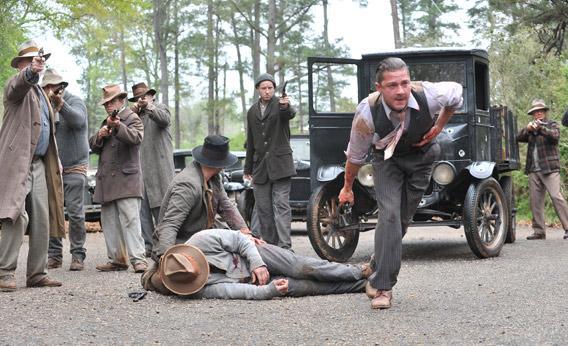Lawless (The Weinstein Company), directed by the Australian filmmaker John Hillcoat (The Proposition) and scripted by his compatriot, the singer/songwriter and sometime novelist Nick Cave, tells the story of a young man struggling to attain tough-guy credibility in the eyes of his older brothers and the world at large. Hillcoat’s film sometimes seems to be straining toward a similar goal. With its bleakly poetic voice-overs and periodic explosions of primal violence, the movie clearly aspires to the kind of existential macho glamour associated with, say, Sam Peckinpah’s Westerns or the novels of Cormac McCarthy (whose The Road Hillcoat adapted for the screen in 2009.) But despite a (mainly) gifted cast and a gorgeously photographed period setting, Lawless never quite attains the mythic grandeur it seeks. There’s something at the movie’s heart that remains flimsy and inauthentic, a kid in his older brother’s ill-fitting shoes.
The Bondurant brothers of Franklin County, Virginia, were a legendary family of moonshine runners during Prohibition. (The brothers’ story is lightly fictionalized in the novel The Wettest County in the World by their descendant, Matt Bondurant, on which Cave’s screenplay is based.) As the action of the film begins, it’s 1931, and Special Deputy Charlie Rakes (Guy Pearce), a gray-gloved dandy from Chicago, has been dispatched to Franklin to shut down all the (many) moonshine stills in operation. The sheriff (a small role played memorably by Bill Camp) reluctantly aligns himself with Rakes, and soon all the local stills have been disabled—except for the Bondurants’. These three orphaned brothers are so tough a local legend has sprung up that they’re indestructible—a myth the savviest Bondurant, Forrest (Tom Hardy) is quick to use to rally locals to their side.
But the youngest of the Bondurants, Jack (Shia LaBeouf), is a closet wuss, less physically prepossessing than his siblings and loath to so much as slaughter a pig. Jack is humiliated by his lowly position as moonshine delivery boy—a task he fulfills in his broken-down jalopy with the help of the even wimpier Cricket (Dane Dehaan.) But it isn’t till Jack’s beaten to a pulp by the sadistic Rakes that he finally resolves to do whatever it takes to win himself some gangster cred. Meanwhile, Jack’s gingerly courting Bertha (Mia Wasikowska), the daughter of a dour Mennonite preacher, while Forrest engages in an ultra-slow-burn flirtation with the town’s luscious new bartender, Maggie (Jessica Chastain)—who also happens to share a boardinghouse hallway with the clammy, ever-looming Rakes.
That’s a lot of plot—and I haven’t even gotten to the storyline about an unlikely alliance between Jack and the legendary Chicago gangster Floyd Banner (played with twinkling menace by a too-seldom-on-screen Gary Oldman). The structural shagginess of Lawless would be more tolerable if the character it devoted the most time to wasn’t the least interesting one. Jack Bondurant is a cornpone-accented variant of a type LaBeouf has already played in both the Transformers films and the unfortunate last installment of the Indiana Jones series: a petulant naïf compelled by circumstance to assume the burden of manhood. LaBeouf embodies Jack’s shambling insecurity ably enough, but 150 minutes of near-constant screen time is just too much LaBeouf. The brother we really want to know more about is Forrest, played by Hardy with circumspect intelligence and a mumbled drawl. Forrest doesn’t say much—to seduce him, the exasperated Maggie eventually has to strip naked and appear at the foot of his bed—but alone among the brothers, he seems worthy of the Bondurant myth, especially after he survives a horrific attempt on his life. As for the third Bondurant, the hulking, Mason-jar-of-hooch-swilling Howard (Jason Clarke), he’s so underdeveloped one suspects his big scene must have ended up on the cutting-room floor.
Guy Pearce’s fey villain is styled to the nines—his shaved-off eyebrows and disturbingly wide middle part make him look like a kind of Prohibition-era punk—but the character doesn’t go any deeper than a stock sneering baddie. The female characters are also indistinctly drawn, with Chastain’s dancer-turned-barmaid dropping hints about a hardboiled past that’s never explored (though I’d trade knowledge of Maggie’s back story for her dressmaker’s phone number—Chastain’s mouthwatering succession of period outfits is the single best reason to see the movie). The music score, much of it written by Nick Cave and his composing partner Warren Ellis, is infectious, but it has a contemporary country-rock sound (with guest performances by the likes of Willie Nelson and Emmylou Harris) that’s distractingly at odds with the pristine period setting. Under the closing credits, though, the bluegrass legend Ralph Stanley sings a stripped-down Appalachian-style cover of Lou Reed’s “White Light/White Heat” with admirable simplicity and restraint—two qualities this overstuffed, underbaked movie could have used more of.
